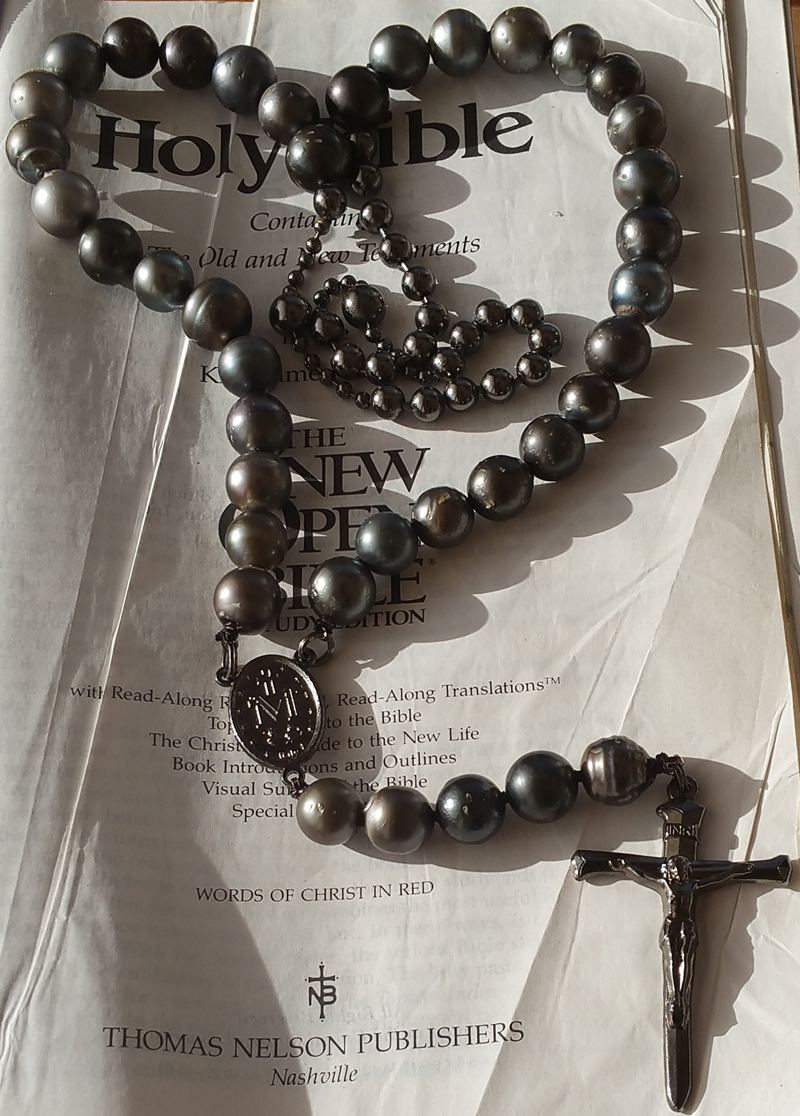Here is what Catholics believe about the Rosary (from the New Advent Catholic Encyclopedia with subtitles inserted by myself for clarification)
In the Western [Catholic] Church
1. These are all repetitive Catholic prayers
"The Rosary", says the Roman Breviary, "is a certain form of prayer wherein we say fifteen decades or tens of Hail Marys with an Our Father between each ten, while at each of these fifteen decades we recall successively in pious meditation one of the mysteries of our Redemption."
2. Rosary usage based on legend
The same lesson for the Feast of the Holy Rosary informs us that when the Albigensian heresy [Catholic label, not necessarily true] was devastating the country of Toulouse, St. Dominic earnestly besought the help of Our Lady [Mary] and was instructed by her, so tradition asserts, to preach the Rosary among the people as an antidote to heresy and sin. [a substitute for the true Gospel]
3. Popes promoted the Rosary
From that time forward this manner of prayer was "most wonderfully published abroad and developed [promulgari augerique coepit] by St. Dominic whom different Supreme Pontiffs have in various past ages of their apostolic letters declared to be the institutor and author of the same devotion."That many popes have so spoken is undoubtedly true, and amongst the rest we have a series of encyclicals, beginning in 1883, issued by Pope Leo XIII, which, while commending this devotion to the faithful in the most earnest terms, assumes the institution of the Rosary by St. Dominic to be a fact historically established.
4. Feast of the Rosary a Catholic feast
Of the remarkable fruits of this devotion and of the extraordinary favours which have been granted to the world, as is piously believed, through this means, something will be said under the headings FEAST OF THE ROSARY and CONFRATERNITIES OF THE ROSARY. We will confine ourselves here to the controverted question of its history, a matter which both in the middle of the eighteenth century and again in recent years has attracted much attention.
5. Rosaries promote vain repetitions of prayers
Let us begin with certain facts which will not be contested. It is tolerably obvious that whenever any prayer has to be repeated a large number of times recourse is likely to be had to some mechanical apparatus less troublesome than counting upon the fingers. [this has no biblical authority whatsoever]
6. Rosaries originated in heathen lands
In almost all countries, then, we meet with something in the nature of prayer-counters or rosary beads. Even in ancient Nineveh a sculpture has been found thus described by Lavard in his "Monuments" (I, plate 7): "Two winged females standing before the sacred tree in the attitude of prayer; they lift the extended right hand and hold in the left a garland or rosary." However this may be, it is certain that among the Mohammedans the Tasbih or bead-string, consisting of 33, 66, or 99 beads, and used for counting devotionally the names of Allah, has been in use for many centuries. Marco Polo, visiting the [Hindu] King of Malabar in the thirteenth century, found to his surprise that that monarch employed a rosary of 104 (? 108) precious stones to count his prayers. St. Francis Xavier and his companions were equally astonished to see that rosaries were universally familiar to the Buddhists of Japan.
7. Monks, hermits and ascetics used rosaries
Among the monks of the Greek Church we hear of the kombologion, or komboschoinion, a cord with a hundred knots used to count genuflexions and signs of the cross. Similarly, beside the mummy of a Christian ascetic, Thaias, of the fourth century, recently disinterred at Antinöe in Egypt, was found a sort of cribbage-board with holes, which has generally been thought to be an apparatus for counting prayers, of which Palladius and other ancient authorities have left us an account. A certain Paul the Hermit, in the fourth century, had imposed upon himself the task of repeating three hundred prayers, according to a set form, every day. To do this, he gathered up three hundred pebbles and threw one away as each prayer was finished (Palladius, Hist. Laus., xx; Butler, II, 63). It is probable that other ascetics who also numbered their prayers by hundreds adopted some similar expedient. (Cf. "Vita S. Godrici", cviii.) Indeed when we find a papal privilege addressed to the monks of St. Apollinaris in Classe requiring them, in gratitude for the pope's benefactions, to say Kyrie eleison three hundred times twice a day (see the privilege of Hadrian I, A.D. 782, in Jaffe-Löwenfeld, n. 2437), one would infer that some counting apparatus must almost necessarily have been used for the purpose. [Note: Hindu sadhus do the same things. And asceticism is condemned in Scripture]



